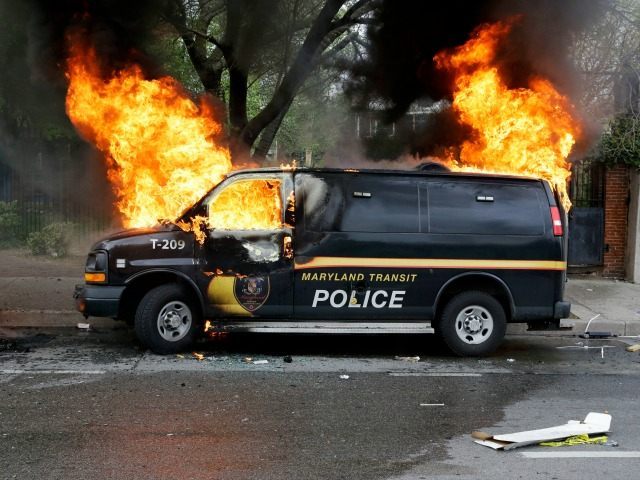A growing majority of lower-income Americans — and especially African-Americans — are worried a great deal about rising crime, according to a new poll.
But there’s little extra concern declared by upper-income, college-educated, Democratic-leaning Americans about rising crime or drug-use reaching into their neighborhoods.
The Gallup poll discovered that 53 percent of respondents say they now “worry a great deal” about rising rates of crime and violence. That is a rapid rise — in 2014, just 39 percent were worried a” great deal” as they are today.
Concern among swing-voting independents rose from 36 percent to 53 percent. Among Republicans, the “great deal” number rose 15 points up to 53 percent, bringing it level with the 52 percent concern among Democrats.
Seventy percent of people with just high-school degrees — but only 32 percent of people with college degrees — said they were worried a great deal about crime. Those two numbers have risen by 20 points and 1 point, respectively, since 2014.
Concern among middle-income people has risen by 20 points since 2014, up to 57 percent. Among upper-income people, concern has apparently risen by only eight points, to merely 36 percent.
GOP front-runner and populist Donald Trump has made the rising crime-rate a major part of his campaign for the GOP nomination. Last year, Trump angered liberals when he said we need to “give power back” to our police officers in order to fight the rising crime. He added to that claim when he said “police are the most mistreated people in America.”
Trump has been so pro-police he even claimed he’d support a policy of making the death penalty mandatory for killing police officers.
But when the numbers are broken down farther it appears non-white respondents are far more worried than whites. Forty-six percent of whites worry a great deal about crime, but 68 percent of non-whites are worried a great deal. As Powerline’s Paul Mirengoff notes, “The reason for the disparities seems obvious. Crime, violence, and drugs afflict nonwhite communities more than white ones.”
Gallup has asked the crime question since 2001. At that time 62 percent said they worried a great deal about crime but by 2002 it had fallen to 49 percent. By 2014 it fell even further to only 39 percent.
But the worries started rising again in 2015 coinciding with a spike in national murder rates, growing complaints by police, and a series of violent, destructive riots that were largely ignored by President Barack Obama.
A recent report in The Washington Post found the number of homicides in the country’s 50 largest cities is up 17 percent, the greatest increase in 25 years.
Despite the apparent lack of concern among upper-income people, there’s some evidence that liberal Americans are growing more concerned about crime. For example, a Democratic staffer recently told The Washington Post that she is taking self-defense classes to protect herself from rising crime in her neighborhood and nationwide.
Melanie Rainer, the staffer, helped win confirmation for Attorney General Loretta Lynch, who is now pushing Obama’s soft-on-crime agenda.
In an article in The Washington Post, Rainer talked about how scared she is to live in Washington, D.C., because there are just too many crimes in her area. “There were so many incidents,” Rainer said. “It’s alarming … We’d check every day and there would be another incident a block from our house.”
The article goes on to describe the self-defense classes the staffer took and quoted her saying, “There has been an increase in crime. It’s an indisputable fact.”
In 2015, violent crime jumped by roughly 20 percent in some areas of D.C., including the Capitol Hill and the Adams Morgan district of bars and apartments. The Washington Post reported on the local trend in October, saying,
Sarah Pitluck used to walk her dogs before dawn, among the early risers exercising on Capitol Hill. She now waits until first light, and for the streets to be busier.
It is just one way the young man who robbed her, ripping the smartphone from her hand and scratching her neck, has changed her daily routine — and her life.
Ever since the Oct. 13 robbery just two blocks from her home, the pharmaceutical executive goes to work later and comes home before it gets dark. Lost time at her office is made up at home, on the phone with her overseas staffers and answering e-mails. She drives more often and pairs with others on neighborhood excursions. Her poodle, Lenzi, and Chihuahua mix, Pedro, get walks only during daylight hours.
A recent wave of street robberies has scared residents of this neighborhood that stretches out from the U.S. Capitol, spilling into Hill East and the Navy Yard neighborhood and up to the H Street corridor. Attackers have stolen not only cellphones and money, but also a sense of security.
The national crime spike comes as Obama and his progressive allies have rolled back enforcement of laws by stigmatizing cops, almost halting the normal repatriation of criminal illegal immigrants and by refusing to prosecute many crimes.
Gallup also asked people about rising drug use. Forty-one percent of whites say they’re worried a “great deal,” up from 27 percent in 2014.
Sixty-two percent of people without college education said they were worried a “great deal” — creating a huge 40-point gap with 22 percent of college-educated people who worry a “great deal” about drugs.
Forty-nine percent of non-whites say they’re worried about drugs a great deal, actually down three points from 52 percent in 2014.
Follow Warner Todd Huston on Twitter @warnerthuston or email the author at igcolonel@hotmail.com

COMMENTS
Please let us know if you're having issues with commenting.